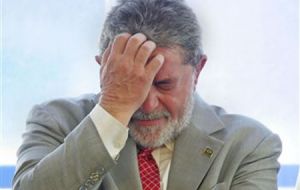MercoPress. South Atlantic News Agency
Brazil Catholic Church attacks government initiative on abortion and gay rights
 Another test for President Lula da Silva political tact
Another test for President Lula da Silva political tact Brazilian president Lula da Silva and his National Program on Human Rights which last week apparently overcame military intransigence, now faces another formidable voice in the country’s politics: the Brazilian Episcopacy, disappointed with the abortion and gay marriage proposals.
The Brazilian Confederation of Bishops, CNBB, openly criticized the de-criminalization of abortion, same sex civil marriage and the right for gay couples to adopt, all initiatives proposed by President Lula da Silva’s human rights initiative sent to Congressional consideration last December 21st.
CNBB also criticized the proposal to eliminate all religious symbols from all public places, “an intolerant attitude” which pretends to ignore the long rooted historic traditions of Brazil, said the release announced Saturday and commented Sunday in all of the country’s Catholic churches.
The Catholic Church hierarchy describes the proposals as “elements of dissent” and said “time and dialogue” were needed to discuss them and thus build “participative democracy”, one of the terms used in the Human Rights Program.
The Human Rights program included all these issues and recommends the Brazilian Congress to draft bills on each of the controversial issues.
The program recommends the approval of legislation protecting the civil union of people of the same sex and the right to adopt for these couples.
It also suggests to the judicial branch that it campaigns to make magistrates more sensitive to the “prejudice” reactions to the adoption process by gay couples.
These issues are extremely sensitive for a very religious people with a conservative hierarchy, even when mores are quite lax.
This is the second hurdle with strong public opinion repercussion that President Lula da Silva’s administration had had to face with the program.
The most notorious was with the military who are opposed to the annulment of an Amnesty Law dating back to 1979 and which left out of the courts’ hook all those involved in human rights abuses including military, security forces and the insurgent Marxist oriented violent groups.
The Minister of Defence and the three chiefs of staff threatened to resign in protest over a Truth Commission to investigate torture and disappearances committed during the 1964/1985 military dictatorship.
The military suggested that to be fair members of the “armed gangs” of the sixties and seventies should also face the Truth Commission. This was a particularly strong criticism since several of President Lula da Silva’s ministers and advisors, including cabinet chief Dilma Rousseff, hand-picked to be the ruling coalition’s presidential candidate, were effectively members of those groups combating the dictatorship`.
Apparently the program in those specific areas is to be re-drafted in consultation with Defence and the 1979 Amnesty Law spirit stands.
Another group which has complained and is certain to have its voice heard is the farmers’ unions that question some of the “rights” guaranteed to peasants and small landowners which are an invitation for “the landless to take over farms”.
Next October presidential elections will be held in Brazil and the ruling Workers Party with Lula da Silva has moved too far past the centre, helping surface at least two left wing candidacies that pull votes out of his majority.
The Human Rights program according to Brazilian press analysts was launched to recall the Workers’ Party credentials as the main opponent to the Brazilian dictatorship.




Top Comments
Disclaimer & comment rulesCommenting for this story is now closed.
If you have a Facebook account, become a fan and comment on our Facebook Page!